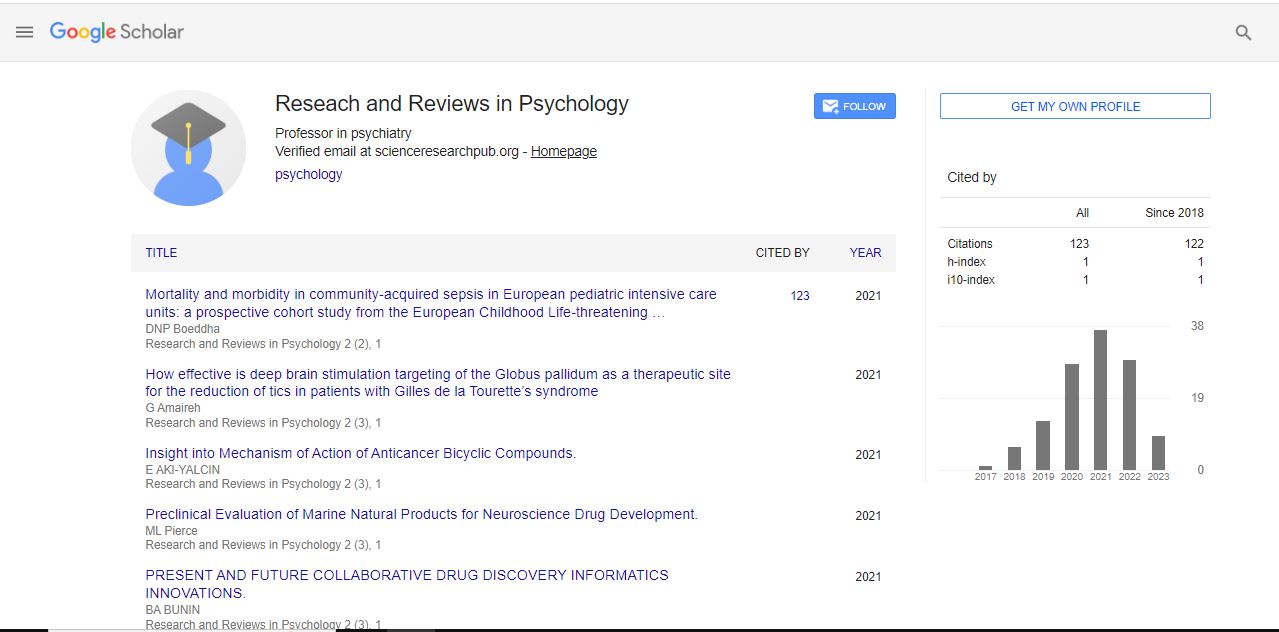Commentary, Res Rev Phys Vol: 4 Issue: 1
Analysis of Developmental Psychology in Human Growth
Nielsen Haun*
1Department of Psychology, University of Leipzig, Leipzig, Germany
*Corresponding Author: Nielsen Haun
Department of Psychology, University of Leipzig, Leipzig, Germany
E-mail: haun.n@gmail.com
Received date: 11 March, 2023, Manuscript No. RRPY-23-95582;
Editor assigned date: 13 March, 2023, PreQC No. RRPY-23-95582 (PQ);
Reviewed date: 27 March, 2023, QC No. RRPY-23-95582;
Revised date: 03 April, 2023, Manuscript No. RRPY-23-95582 (R);
Published date: 13 April, 2023, DOI: 10.4172/rrpy.1000332.
Citation: Haun N (2023) Analysis of Developmental Psychology in Human Growth. Res Rev Phys 4:1.
Description
Developmental psychology is a branch of psychology that focuses on studying the changes that individuals endure difficulties throughout their lifespans, from birth to old age. It aims to understand the physical, cognitive, emotional, and social changes that occur as individual development through various stages of life. Developmental psychologists use various theories and research methods to obtain comprehending into how humans develop, how they learn, and how they adapt to their environment. The study of developmental psychology can be divided into three broad categories: Physical development of psychology, cognitive development of psychology, and socio-emotional development of psychology. Each category encompasses various stages of development and accomplishments that individuals typically experience as they grow and develop.
Physical development in psychology
Physical development in psychology refers to the changes that occur in the body, such as growth in height and weight, changes in muscle and bone density, and the development of primary and secondary gender characteristics. It starts from the moment of conception and continues throughout an individual's existence. It is an essential aspect of psychology because it affects many other areas of development, including cognitive, social, and emotional development.
Psychology is one of the most important aspects of physical development. The development refers to the increase in size and weight of the body. The procedure begins during pregnancy and continues throughout their lives. During the prenatal period, the foetus develops rapidly, with the most significant growth occurring during the first pregnancy. Development reduces after birth but continues at a constant rate until the age of 18. There is an intense period of development during childhood, and the human body experiences many changes in size and shape.
Cognitive development in psychology
Cognitive development in psychology refers to the changes that occur in an individual's analyzing and mental procedures. It encompasses the development of language, memory, perception, problem-solving, and decision-making skills. Cognitive development is influenced by a combination of genetic and environmental factors. Jean Piaget's theory of cognitive development is one of the most widely recognized and influential theories in developmental psychology. According to Piaget, cognitive development occurs in four stages: The sensorimotor stage, preoperational stage, concrete operational stage, and the formal operational stage.
The sensorimotor stage (from birth to two years) is characterized by the development of basic cognitive skills such as object permanence, the ability to understand that an object still exists even if it is not visible. The preoperational stage (from two to seven years) is characterized by the development of symbolic thinking and languages employ to represent concepts and objects. The concrete operational stage (from seven to twelve years) is characterized by the development of logical thinking and the ability to understand concrete concepts. The formal operational stage (from twelve years) is characterized by the development of conceptual reasoning and hypothetical reasoning ability.
Socio-emotional development in psychology
Socio-emotional development in psychology refers to the changes that occur in an individual's emotional and social functioning. It encompasses the development of relationships with others, the ability to regulate emotions, and the development of an illusion of selfidentity. Erik Erikson's theory of psychosocial development is a widely recognized and influential theory in developmental psychology. According to Erikson, individuals endure eight stages of psychosocial development throughout their lifespan. Each stage is characterized by specific psychosocial difficulties.
 Spanish
Spanish  Chinese
Chinese  Russian
Russian  German
German  French
French  Japanese
Japanese  Portuguese
Portuguese  Hindi
Hindi 